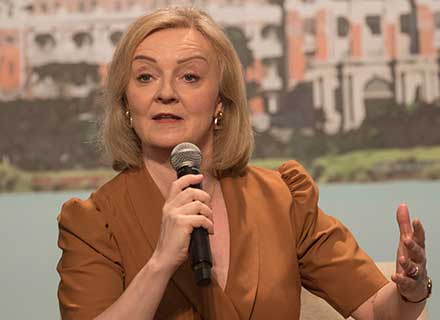According to new data, the British taxpayer had to contribute tens of millions of pounds extra to cover the European Union’s divorce cost in pounds due to the weakening of the pound at the time of former Prime Minister Liz Truss’s failed budget plans.
The British finance ministry recorded a loss of 91 million pounds ($118 million) in its annual report last month due to currency fluctuations associated with payments to the EU made during the fiscal year 2022–2023 in accordance with the conditions of the Brexit settlement.
The “reportable losses” for the Treasury in recent years have varied from 0 to a few million pounds.
A payment to the EU on September 30, 2022—one week after the release of Liz Truss’ tax-cutting “Growth Plan”—was the source of about half of the 91 million-pound loss, according to a Reuters investigation.
When 1 pound could only buy 1.12 euros, this 855 million-euro payment cost Britain 764 million pounds.
When the EU revised Britain’s payment schedule for June through September back in April 2022, it made the assumption that the exchange rate would be approximately 1.18 euros to 1 pound, which would result in monthly payments of 719 million pounds rather than 764 million pounds.
The biggest set of tax cuts in decades was included in Liz Truss’ Growth Plan, which was released on September 23 and is popularly known as the “mini-budget.” This move resulted in a collapse of the British financial markets that was made worse by the design of pension funds.
Sterling had an instant decline, reaching its lowest level since late 2020 on September 26 at 1.08 per euro, before somewhat recovering in the days leading up to the EU divorce payment on September 30.
Although the tens of millions of pounds in losses from currency fluctuations surrounding the EU payments are negligible economically, they nonetheless represent a real cost associated with market volatility around the time of the mini-budget.
A Treasury spokeswoman stated that “foreign exchange fluctuations are foreseen over the duration of the Withdrawal Agreement” and that Britain had made a total net gain of 0.1 million pounds during the period covered by the payments in 2021/22 and 2022/23.
Even yet, the payment on September 30 was a glaring loss-maker, and the little net gain reflects a significant decline from March 2022 when it stood at 91.2 million pounds.
According to James Murray, a spokesman for the opposition Labour Party, “This is yet more proof of the devastating harm done to the UK’s public finances by this Tory government, handing over millions more to the EU than should have been paid, after their irresponsible policies plunged the pound into freefall.”
According to economists, the overall costs of the mini-budget crisis, which result from a decline in investor confidence and an increase in market interest rates, are in the billions of pounds.
Documents from the independent Office for Budget Responsibility showed that former finance minister Kwasi Kwarteng ignored official warnings that borrowing was on track to soar, even before he attempted his disastrous Growth Plan, according to Reuters, which broke the story last week.

